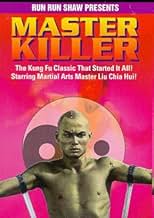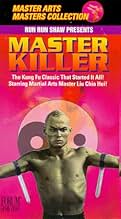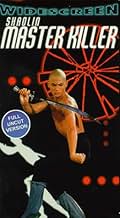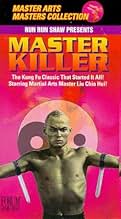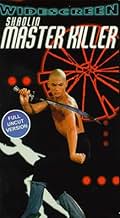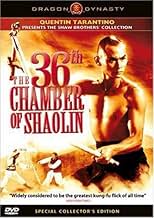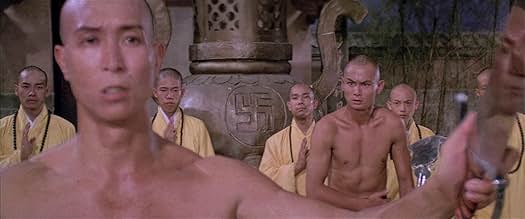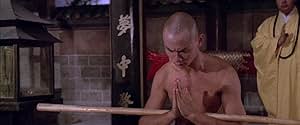VALUTAZIONE IMDb
7,6/10
19.602
LA TUA VALUTAZIONE
Un uomo impara il Kung Fu al Tempio dello Shaolin per lottare contro l'oppressivo governo di Manchu.Un uomo impara il Kung Fu al Tempio dello Shaolin per lottare contro l'oppressivo governo di Manchu.Un uomo impara il Kung Fu al Tempio dello Shaolin per lottare contro l'oppressivo governo di Manchu.
- Regia
- Sceneggiatura
- Star
- Premi
- 1 candidatura in totale
Lo Lieh
- General Tien Ta
- (as Lieh Lo)
Yue Wong
- Miller Six
- (as Yu Wang)
Liu Chia-Yung
- General Yin
- (as Chia-Yung Liu)
Norman Chu
- Lu Ah-Tsai
- (as Shao-Chiang Hsu)
Yung Henry Yu
- Hung Hsi-Kuan
- (as Yang Yu)
John Cheung
- Lord Cheng
- (as Wu-Liang Chang)
Wilson Tong
- Tang San-Yao
- (as Tang Wei-cheng)
Hoi-Sang Lee
- Abbot of Justice Office
- (as Hai-Sheng Li)
Kwok-Choi Hon
- Lin Chen
- (as Kuo-Tsai Han)
Recensioni in evidenza
Perhaps cultural differences prevent understanding the significance and excellence of this film.
The original title The 36th Chamber of Shaolin refers to San Te requesting from the Head Abbot of Shaolin permission to teach Shaolin martial skills to Han Chinese to give them the tools needed to fight the occupying Manchus of the Qing Dynasty (1644-1910) who were seen as outsiders. Chinese today still generally hate the Qing and wish that dynasty never happened, as their corruption and shortsightedness in the 20th Century was perceived to have weakened the country leading to some regions being colonized by many foreign powers at the time. Hong Kong was a colony taken by the British after humiliating the Chinese in a resounding defeat in the Opium Wars.
The fact that the Hong Kong film industry made films about rebellion should be understood within this context of Hong Kong as a British Colony. Master Lau is Cantonese (as was Wong Fei-hung), so has a particular closeness to the problematic colonial relationship with the occupying British. This is why I consider this film to be an interesting example of post colonial film.
This background is essential to understanding the significance of the statement made by Master Lau in this film. It is not "just a simple revenge tale" but the revenge is the moral and ethical response (in Chinese the technical/philosophical term is "righteousness" or in English best described as "justice") for the brutal murder of his classmates, ethics teacher, and his family. In the first part of the film, Master Killer (played by Master Lau's adopted brother, Liu Chia-hui, Master Lau's real brother plays the rebellious General Yin who fights with the ax) is studying Confucian ethics. After all their friends and family are ruthlessly slaughtered for participating in a revolt against the occupying Qing (Manchu) forces, Master Killer's friend laments that it was pointless to study ethics, as it was useless for them to save their loved ones and resist the Qings. "No," Master Killer replies, "ethics has taught us to be loyal (another Confucian term) to our loved ones, so we must get revenge. If either of us survive we MUST make it to Shaolin, learn martial arts, and get revenge!"
This political message is what makes this film more than just an arbitrary action film. In the West, actioners typically don't embed violence in such a bitter context. Here, the violence holds deep meaning within the context of foreign invasion and occupation. Here it is seen as the ethical action, which is how San Te responds to his first victim of revenge (where he meets Hung Xiguan) when his victim demands, "You can't kill me you're a monk!" To which San Te replies, "Even Buddha punished evil!"
Though HK cinema had just a fraction of the budget enjoyed by the glorified garbage of most Hollywood actioners, it makes up for in dangerous political messages, unparalleled martial arts mayhem, and real martial skills of the actors. The actors in these films (like Bollywood films where the actors have to display dancing skills) actually have to do something skillful on screen as opposed to just prancing around like primadonnas. If you think the acting is overdone, this results from HK cinema arising out of Peking Opera traditions (like Sammo Hung, Jackie Chan, Yuen Biao, and Corey Yuen came out of) which has a particular style of acting that has its own idiom.
Some background: This film is directed and choreographed by Master Lau (Liu Chia-liang or Lau Kar Leung). His father (and grandfather) were disciples of Butcher Wing (as depicted by Sammo Hung in The Magnificent Butcher), who was Wong Fei-hung's toughest disciple. Wong Fei-hung's style is Hung-gar, named for Hung Xiguan, (Donnie Yen plays him in the Hong Kong TV show released in the US on DVD as The Kungfu Master and Revenge of the Kungfu Master) the only disciple to survive the burning of the Shaolin Temple (there was more than one temple).
For this *legendary* story (these stories form a sort of oral history in martial arts circles, but may be doubted by Western historians, who specialize in rejecting oral histories such as the Hemmings' family oral histories of Thomas Jefferson's habitual raping of his wife's half sister, Sally Hemmings) a good movie to see is Heroes Two and its sequel Disciples of Death, starring Chen Kuan Tai (a real master of Monkey Kungfu) as Hung Xiguan and Alexander Fu Sheng (the kungfu genius who tragically died in an auto accident in his prime around 1984) as Fang Shiyu (aka Fong Sai-yuk, also played by Jet Li in two movies of the same name). This film is the beginning of all these movies as it shows the history that produced San Te the first Shaolin monk to teach outsiders.
I hope some of this history, background, and perspective will help viewers appreciate the greatness of this film. Other films Lau made or helped choreograph that I recommend is: The Deadly Duo, The Heroic Ones, Shaolin Mantis, Mad Monkey Kungfu, Executioners of Death, Heroes Two, its sequel: Disciples of Death, Five Masters of Death, Shaolin Martial Arts, Legendary Weapons of Kungfu, 8 Diagram Pole Fighters, Disciples of Master Killer (Master Killer III) 1984/5, Legend of Drunken Master (Drunken Master II), etc. Many of the movies he is involved with are worth watching, at least for their action even if sometimes the plot lines are a little weak.
This film has it all action, drama, good characters, great plot, and some of the best fight scenes put to celluloid. DON'T SLEEP ON THIS! Though I've literally seen thousands of the best films from all over the world of all different time periods, this one is one of my all-time favorites!! I hope you enjoy it even a fraction of how much I do!
The original title The 36th Chamber of Shaolin refers to San Te requesting from the Head Abbot of Shaolin permission to teach Shaolin martial skills to Han Chinese to give them the tools needed to fight the occupying Manchus of the Qing Dynasty (1644-1910) who were seen as outsiders. Chinese today still generally hate the Qing and wish that dynasty never happened, as their corruption and shortsightedness in the 20th Century was perceived to have weakened the country leading to some regions being colonized by many foreign powers at the time. Hong Kong was a colony taken by the British after humiliating the Chinese in a resounding defeat in the Opium Wars.
The fact that the Hong Kong film industry made films about rebellion should be understood within this context of Hong Kong as a British Colony. Master Lau is Cantonese (as was Wong Fei-hung), so has a particular closeness to the problematic colonial relationship with the occupying British. This is why I consider this film to be an interesting example of post colonial film.
This background is essential to understanding the significance of the statement made by Master Lau in this film. It is not "just a simple revenge tale" but the revenge is the moral and ethical response (in Chinese the technical/philosophical term is "righteousness" or in English best described as "justice") for the brutal murder of his classmates, ethics teacher, and his family. In the first part of the film, Master Killer (played by Master Lau's adopted brother, Liu Chia-hui, Master Lau's real brother plays the rebellious General Yin who fights with the ax) is studying Confucian ethics. After all their friends and family are ruthlessly slaughtered for participating in a revolt against the occupying Qing (Manchu) forces, Master Killer's friend laments that it was pointless to study ethics, as it was useless for them to save their loved ones and resist the Qings. "No," Master Killer replies, "ethics has taught us to be loyal (another Confucian term) to our loved ones, so we must get revenge. If either of us survive we MUST make it to Shaolin, learn martial arts, and get revenge!"
This political message is what makes this film more than just an arbitrary action film. In the West, actioners typically don't embed violence in such a bitter context. Here, the violence holds deep meaning within the context of foreign invasion and occupation. Here it is seen as the ethical action, which is how San Te responds to his first victim of revenge (where he meets Hung Xiguan) when his victim demands, "You can't kill me you're a monk!" To which San Te replies, "Even Buddha punished evil!"
Though HK cinema had just a fraction of the budget enjoyed by the glorified garbage of most Hollywood actioners, it makes up for in dangerous political messages, unparalleled martial arts mayhem, and real martial skills of the actors. The actors in these films (like Bollywood films where the actors have to display dancing skills) actually have to do something skillful on screen as opposed to just prancing around like primadonnas. If you think the acting is overdone, this results from HK cinema arising out of Peking Opera traditions (like Sammo Hung, Jackie Chan, Yuen Biao, and Corey Yuen came out of) which has a particular style of acting that has its own idiom.
Some background: This film is directed and choreographed by Master Lau (Liu Chia-liang or Lau Kar Leung). His father (and grandfather) were disciples of Butcher Wing (as depicted by Sammo Hung in The Magnificent Butcher), who was Wong Fei-hung's toughest disciple. Wong Fei-hung's style is Hung-gar, named for Hung Xiguan, (Donnie Yen plays him in the Hong Kong TV show released in the US on DVD as The Kungfu Master and Revenge of the Kungfu Master) the only disciple to survive the burning of the Shaolin Temple (there was more than one temple).
For this *legendary* story (these stories form a sort of oral history in martial arts circles, but may be doubted by Western historians, who specialize in rejecting oral histories such as the Hemmings' family oral histories of Thomas Jefferson's habitual raping of his wife's half sister, Sally Hemmings) a good movie to see is Heroes Two and its sequel Disciples of Death, starring Chen Kuan Tai (a real master of Monkey Kungfu) as Hung Xiguan and Alexander Fu Sheng (the kungfu genius who tragically died in an auto accident in his prime around 1984) as Fang Shiyu (aka Fong Sai-yuk, also played by Jet Li in two movies of the same name). This film is the beginning of all these movies as it shows the history that produced San Te the first Shaolin monk to teach outsiders.
I hope some of this history, background, and perspective will help viewers appreciate the greatness of this film. Other films Lau made or helped choreograph that I recommend is: The Deadly Duo, The Heroic Ones, Shaolin Mantis, Mad Monkey Kungfu, Executioners of Death, Heroes Two, its sequel: Disciples of Death, Five Masters of Death, Shaolin Martial Arts, Legendary Weapons of Kungfu, 8 Diagram Pole Fighters, Disciples of Master Killer (Master Killer III) 1984/5, Legend of Drunken Master (Drunken Master II), etc. Many of the movies he is involved with are worth watching, at least for their action even if sometimes the plot lines are a little weak.
This film has it all action, drama, good characters, great plot, and some of the best fight scenes put to celluloid. DON'T SLEEP ON THIS! Though I've literally seen thousands of the best films from all over the world of all different time periods, this one is one of my all-time favorites!! I hope you enjoy it even a fraction of how much I do!
Wow, I had no idea. Turns out "The 36th Chamber of Shaolin" is one of the best movies I've ever seen.
A simple man, his friends and his father are victimized by a brutal Manchu dictator and he is run out of town. Injured, he makes his way to the Shaolin Temple where he is determined to learn kung-fu. He starts at the top and works his way down, encountering insane training exercises and rigorous obstacles along the way. He proves to be a worthy candidate and then some in what turns into one of the coolest revenge plots in a movie ever.
Amazing choreography, stunts, violence, fight scenes and much more highlight this wicked cool flick. I recommend seeing it for sure.
9 out of 10, kids.
A simple man, his friends and his father are victimized by a brutal Manchu dictator and he is run out of town. Injured, he makes his way to the Shaolin Temple where he is determined to learn kung-fu. He starts at the top and works his way down, encountering insane training exercises and rigorous obstacles along the way. He proves to be a worthy candidate and then some in what turns into one of the coolest revenge plots in a movie ever.
Amazing choreography, stunts, violence, fight scenes and much more highlight this wicked cool flick. I recommend seeing it for sure.
9 out of 10, kids.
10dee.reid
Anyone familiar with the hip-hop super-group the Wu-Tang Clan knows that "The 36th Chamber of Shaolin" (a.k.a. "Shaolin Master Killer"), directed in 1978 by Liu Chia-Liang, is essential viewing for any martial arts movie fan. This movie started the whole "good-guy-gets-his-butt-kicked-and-undergoes-martial arts-training-to-exact-vengeance" storyline that's been used so many times in the martial arts movies since (i.e., the American "Karate Kid" movies). In it, anti-Manchu patriot San Te (Gordon Liu) is a humble country boy who is cast out of his village when Manchu soldiers (led by the villainous Lo Lieh) slaughter his parents, orphaning him. He manages to make it to the famous Shaolin Temple, where he is nursed back to health by the monks living there, and soon undergoes a rigorous and dangerous regiment of training to master the 35 "chambers" (styles) of kung-fu. In seven years, he completes his training, mastering all 35 styles, invents a brand-new weapon (the three-section staff), and suggests creating a 36th chamber - to spread kung-fu beyond the Shaolin Temple's walls and bring it to the masses. The whole story is pretty formulaic (what martial arts movie from the '70s doesn't have a formulaic plot?), but what gets this movie going is its rousing training sequences. These are not the run-of-the-mill stuff we're used to seeing in these movies. San Te's quest to become a martial arts warrior is a tortuous journey of self-actualization, a kind of virtue commonly lacking in the genre; San Te actually becomes a better person as a result of his experiences at the Shaolin Temple. Most grind-house cinema aficionados love this movie (Wu-Tang Clan co-founder the RZA in "The Wu-Tang Manual" does an entire section on the martial arts movies that influenced his development of the Wu-Tang Clan and much of their underlying philosophy). Finally, I'm glad to see an old-school martial arts movie that has its heart and brain in the right places.
10/10
10/10
Firstly, let me say that Chia Hui Liu (aka Gordan Liu) "MAKES" this movie. It would not be what it is without him. To be fair, I have to give notice that every movie with him and the director (who I understand is a relative) is good. Now, let me tell why. Liu gives effort and emotion to his parts. Every part and every movie I have seen him in, this has been the case. When there is anger, you see it in his face. When there is despair, you see it. He makes it almost tangible. Plus, he has "skills". Also, this movie has plot and believability. It's interesting and "absorbing". The one I watched was "English" dubbed, but the dubbing was good. Even the sound track was complimentary for the scenes.
I's unfortunate that the asian movie industry has been in the past just like the American sports industry was. The take talented young people, chew up their juices, and then spit them out all used up.
I wonder if Liu even suspected that he had attained "Classic" status with this movie as far as "old school Kung-Fu fans" in the North-east USA are concerned?
I's unfortunate that the asian movie industry has been in the past just like the American sports industry was. The take talented young people, chew up their juices, and then spit them out all used up.
I wonder if Liu even suspected that he had attained "Classic" status with this movie as far as "old school Kung-Fu fans" in the North-east USA are concerned?
for some eight years, Liu Chia Liang worked as martial arts choreographer at shaw bros., especially with legendary director Chang Cheh, from whom Liu clearly learned mise-en-scene, as the french call it - a director's skill in using camera, editing and theme to move from one dramatic episode to another. in turn, Liu tried to show Chang Che the possibilities inherent in traditional kung fu, but to little avail - Chang Che really always thought himself a maker of action-adventure films, not primarily a martial arts director. so Liu began making his own films at shaw bros., and demonstrated what he learned from Chang Che, while developing his own themes concerning the the traditional arts we've come to call kung fu.
one decided difference between Liu and Chang - indeed, between Liu and most of the other shaw bros. directors of the period - is that Liu believed that if the fundamental message of kung-fu - which is really about good health and spiritual growth - is to be carried over to the audience, the arts involved would need to be presented in as realistic a fashion as possible - no wire works, no unnecessary leaping over walls, no mythical 'iron fist' technique of jamming one's hand through someone's chest. and once that decision was made, clearly it would also be necessary to develop plots and characters as equally realistic, or the effort would be for nothing.
Liu's movies are thus 'about' kung fu in the purest sense; they are not about fighting, but about discipline. they are not about revenge, they are about using one's training to get beyond revenge.
although the heavy tone of this film obscures it a little, the fact remains that the characters in this film are all very believably human in a way that Chang Che's characters never were. and they don't learn their skills all that quickly - the time frame of the shaolin episode is at least three years - but by doing the same excersizes over and over again until they are perfectly comfortable with them. at which point, of course, they can perform with almost no show of effort.
by the way, there are documentary films of real performances of real shaolin monks demonstrating real martial arts - Liu is pretty close to the real thing, here.
Liu, by the way, appears to be the son of someone who trained with lam sai wing - aka 'butcher' wing, but in no way the country bumpkin he's sometimes made out to be, as in yuen woo ping's 'magnificent butcher'. lam sai wing studied with the legendary Wong Fei Hong, who was taught not only by his classically trained father, but by a well-known former shaolin monk - in short, the Liu credentials are rock solid.
Gordon Liu, star of the film, is Chia Leung's adoptive brother. he is probably the finest performer of traditional kung fu ever filmed, bar none, and utterly fascinating to watch. he also does a solid piece of acting in this film, as well.
shaw bros. quality, Liu bros. skill - don't ask, just see it.
one decided difference between Liu and Chang - indeed, between Liu and most of the other shaw bros. directors of the period - is that Liu believed that if the fundamental message of kung-fu - which is really about good health and spiritual growth - is to be carried over to the audience, the arts involved would need to be presented in as realistic a fashion as possible - no wire works, no unnecessary leaping over walls, no mythical 'iron fist' technique of jamming one's hand through someone's chest. and once that decision was made, clearly it would also be necessary to develop plots and characters as equally realistic, or the effort would be for nothing.
Liu's movies are thus 'about' kung fu in the purest sense; they are not about fighting, but about discipline. they are not about revenge, they are about using one's training to get beyond revenge.
although the heavy tone of this film obscures it a little, the fact remains that the characters in this film are all very believably human in a way that Chang Che's characters never were. and they don't learn their skills all that quickly - the time frame of the shaolin episode is at least three years - but by doing the same excersizes over and over again until they are perfectly comfortable with them. at which point, of course, they can perform with almost no show of effort.
by the way, there are documentary films of real performances of real shaolin monks demonstrating real martial arts - Liu is pretty close to the real thing, here.
Liu, by the way, appears to be the son of someone who trained with lam sai wing - aka 'butcher' wing, but in no way the country bumpkin he's sometimes made out to be, as in yuen woo ping's 'magnificent butcher'. lam sai wing studied with the legendary Wong Fei Hong, who was taught not only by his classically trained father, but by a well-known former shaolin monk - in short, the Liu credentials are rock solid.
Gordon Liu, star of the film, is Chia Leung's adoptive brother. he is probably the finest performer of traditional kung fu ever filmed, bar none, and utterly fascinating to watch. he also does a solid piece of acting in this film, as well.
shaw bros. quality, Liu bros. skill - don't ask, just see it.
Lo sapevi?
- QuizThe movie won the Best Martial Arts Award at 24th Asian Film Festival and was the 1978 Top 10 Box Office Hits in Hong Kong.
- Citazioni
Senior monk: The wall may be low, but the Buddha is high.
- Versioni alternativeWest German theatrical version was cut by ca. 30 minutes. Subsequent TV and VHS releases were cut as well. Only in 2004 the film was redubbed and released completely uncut on DVD by MiB.
- ConnessioniFeatured in Martial Arts Mayhem Vol. 2 (1998)
I più visti
Accedi per valutare e creare un elenco di titoli salvati per ottenere consigli personalizzati
- How long is The 36th Chamber of Shaolin?Powered by Alexa
Dettagli
- Data di uscita
- Paese di origine
- Lingua
- Celebre anche come
- The 36th Chamber of Shaolin
- Luoghi delle riprese
- Azienda produttrice
- Vedi altri crediti dell’azienda su IMDbPro
Contribuisci a questa pagina
Suggerisci una modifica o aggiungi i contenuti mancanti


